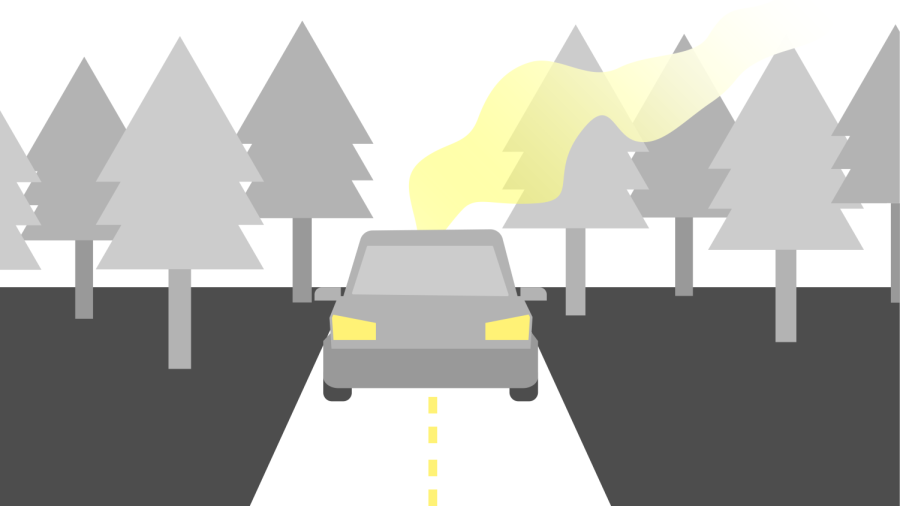Langley: Cars Make Cities Worse
(Design by Claire Peterson | The Daily Utah Chronicle)
March 29, 2023
A long-standing symptom of America’s gung-ho approach to individual freedom is our love of the automobile. Since the introduction of the Model T Ford over one hundred years ago, cars have dominated American transportation and infrastructure. We even view them as reflections of ourselves and place them among our most valued possessions. However, many today question our relationship with cars. While the push for electric vehicles can help to tackle emissions and climate change, the many other ill effects of cars continue to destroy our cities.
Cars negatively affect our environment and economy, making our lives more dangerous, depressing and unhealthy.
Car Emissions and Environmental Costs
Widespread car use has astronomical environmental impacts. While emissions are the main culprit, vehicle production and the cities we design around them also play a role in cars’ environmental impact.
The transportation industry in America is the largest carbon source in the nation. Alongside other harmful chemicals, a typical passenger car emits around 4.6 metric tons of carbon dioxide annually. This carbon output, multiplied by the nearly 300 million registered vehicles in the United States, is just one reason these machines pose real problems.
Electric cars produce far fewer emissions than their gasoline-powered counterparts, but that amount varies drastically from state to state due to energy sources available. For example, Utah’s average electric vehicle produces more emissions than electric vehicles in 45 other U.S. states. Utah’s reliance on coal and gas makes electric car usage less environmentally friendly than in greener states.
The production process of both gasoline-powered and electric cars has a negative impact on the environment, too. With the push for electric vehicles underway, the automotive industry will put billions of dollars towards expanding mining operations to keep up with demands. Unfortunately, electric car production necessities, like lithium, are often irresponsible sourced and lead to widespread pollution.
Cars Diminish Health and Safety
In addition to their enormous environmental impact, car emissions damage community health. While many are aware of lung damage from car emissions, cars also affect other major bodily systems. Continuous exposure to emissions increases the occurrence of conditions like leukemia, infertility and premature death for those living in urban areas. A disproportionate amount of those who develop these conditions from car emissions come from low-income, tribal or communities of color. However, emission consequences don’t stop at physical health. A mere five-microgram increase in emissions per cubic meter can result in mental health issues such as depression and anxiety.
Dependence on automobiles for transportation can also negatively affect a person’s physical and mental health. Cars have and continue to promote the sedentary lifestyle of the modern American. As far back as the 1950s, the use of cars strongly correlates to increased rates of obesity. Those who must drive for extended periods, such as truck and taxi drivers, can develop severe conditions like deep-vein thrombosis, a condition associated with blood clots in the arms or legs and, often, heart attacks.
Cars can also adversely affect the mental health of drivers. While going for a quick drive can clear your mind, commuting to work does the opposite. Longer commutes often cause increased stress levels and lower life satisfaction rates. Being stuck and alone in your car for extended periods can also cause feelings of social isolation in commuters. The mentally draining nature of car usage explains why so many dread rush hour and feel significantly fatigued afterward.
Even as cars become comparatively safer, the fatality rate of car crashes has gotten higher over time. This situation, paired with an increase in the number of large vehicles like SUVs and trucks on the road, has created a more dangerous environment for children.
Furthermore, many conditions, whether caused by the environment or by the irresponsibility of other drivers, increase the risk of driving for the driver and pedestrians. Poor weather conditions lead to over one million car crashes in the U.S. every year. Hazardous weather conditions in Utah are common during winter and avalanches and snow storms increase the rate of car crashes. However, cars put people at risk at any time of the year. Drunk driving, texting while driving and other forms of distracted or reckless driving pose a severe threat. We witnessed nearly 43,000 traffic fatalities in 2021 and over 30,000 in the first nine months of 2022.
How Cars Have Affected Society
For generations, car-centric infrastructure — namely the interstate highway system — has actively displaced and worsened the health conditions of people of color in our cities. These issues persist even today. West-side Salt Lake City residents, who comprise most of West Valley’s minority population, currently face the possible I-15 expansion — which could increase air and noise pollution and displace businesses.
Car-centric infrastructure severely hinders the transportation of those without vehicles and limits their ability to get food and find work. With new cars financially out of reach for the average American, we cannot continue to rely on cars.
Given the various interlocking issues associated with cars, it is baffling to see our urban centers continuing their reliance on car-centric development. Cars make urban life worse for drivers and pedestrians in almost every way imaginable. By creating an overreliance on vehicles, we have traded a healthy environment and our physical and mental health for mere convenience. It is time that we move forward from the terrible mistake of creating a car-centric transport system and embrace the walkable city designs of contemporary city planning.









